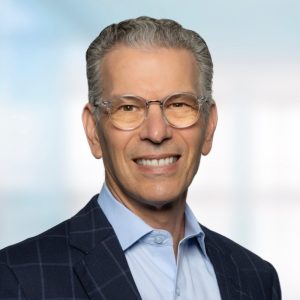The Race to Value Podcast

Ep 167 – Data Rx: Unlocking the Potential for an Open and Connected Health System, with Dr. David Feinberg

Data enablement has the power to transform American Healthcare. It can foster trust between patients and clinicians and make healthcare more accessible, affordable and equitable. This future of an open and connected health ecosystem may seem elusive, but it’s not out of reach. Technology will not hold us back — instead our biggest challenge will be creating a value-based model of care where new innovations can thrive.
This week we our joined by Dr. David Feinberg, the Chairman of Oracle Health. Dr. Feinberg is committed to advancing thought leadership and strategy related to unleashing the healing power of data through an open and connected healthcare ecosystem. Previously Dr. Feinberg served as president and CEO of Cerner, now Oracle Health, where he led teams delivering tools and technology to improve the patient and caregiver experience. He has also served as the VP of Google Health, and he served as the President and CEO of Geisinger where he led a complex turnaround and guided Geisinger’s transition to value-based care.
Episode Bookmarks:
01:30 Introduction to Dr. David Feinberg, Chairman of Oracle Health.
02:45 The massive generation of data by humankind in the modern day (projected to be 175 Zettabytes by 2025).
03:45 Approximately 80% of healthcare data today is unstructured.
04:30 People are dying unnecessarily and suffering poor outcomes despite the amount of data generated by the healthcare system.
05:30 “Healthcare fundamentally is people caring for people. Data is secondary; the primary aspect of healthcare is trust.”
06:30 Making Electronic Health Records usable is of paramount importance (PCPs Need 27 Hours a Day to Do Their Best Work!)
07:00 Digitizing the medical record has made clinical workflows humanly impossible and compromises trust.
07:30 The vision for an open and connected health data ecosystem.
08:45 The Meaningful Use program did nothing for EHR usability (an example of the Gartner Hype Cycle).
10:00 Dr. Feinberg’s clinical and executive leadership background provided a great lesson in technology adoption.
11:00 Can there be a high level of technology adoption in healthcare like Google dominates the non-healthcare marketplace?
12:30 We have solved for interoperability, but healthcare lacks a level of usability to allow a true longitudinal health record.
14:00 Motivating doctors for high performance ultimately comes down to the data scorecard.
15:00 Knowing the game (volume vs. value) and the promise of data enablement in value-based care.
16:00 The 21st Century Cures Act and the path forward in interoperability.
17:00 Can scalable FHIR-based interoperability and Open APIs eventually reach critical mass in the U.S. to improve population health?
19:45 Dr. Feinberg describes the two points of failure by technology companies trying to disrupt the healthcare ecosystem.
20:30 How Oracle Cerner is designing an intelligent, cloud-enabled platform to change healthcare for the better.
22:00 An example of disruption with Internet Banking and how application of those principles could change the healthcare system.
23:45 Digitization of medical records was a requisite first step.
24:00 Integration and normalization of disparate data sets provides an opportunity to create data intelligence.
25:00 How Larry Ellison’s impatience for healthcare disruption clashes with the realities of the industry.
26:30 Recognizing the “life and death” aspects of healthcare transformation.
27:00 Making incremental progress with a digitized medical record…and then COVID happens to accelerate value-based care!
29:00 Workforce burnout and EHR usability – “Simplicity is the ultimate art of sophistication.”
30:00 “Value-based care is ultimately the best way to address the root cause of burnout in the workforce.”
30:45 The need for UX in the design of EHR applications to optimize physician workflow.
31:30 Results in usability redesign — ex: 19% reduction in nursing time at the terminal, 8M less clicks at one health system.
31:45 “The future of EHRs has to be where everything is voice-enabled. Physicians and nurses should be freed from the terminal.”
32:30 An example of how sophisticated AI can be used to generate EHR documentation in a regular primary care visit.
33:30 Nurses spend half their time at the terminal. (Voice-enabled EHR documentation could double the nursing workforce!)
34:30 The game changing nature of voice-enablement. This innovation is in our lifetime!
36:00 The historical opportunity to address health inequities.
37:00 The Oracle Cerner Learning Health Network — unlocking the power of data to improve health equity.
38:00 Using clinical trials to build a foundational infrastructure for equity.
39:00 The use of advanced AI and clinical trials to improve diagnostic capabilities and clinical outcomes.
41:00 The movement to precision-based care to personalize treatment (ex: genomics, wearables)
42:00 Geisinger’s population-based precision health model and how it drives patient-specific care pathways.
43:00 Making data understandable and culturally sensitive for patients in order to improve adherence.
44:00 Parting thoughts — the importance of making healthcare understandable, accessible, and affordable.
46:00 Why sharing of best practices is so important for the future of our industry. The time is now!






 Visit Podcast Website
Visit Podcast Website RSS Podcast Feed
RSS Podcast Feed Subscribe
Subscribe
 Add to MyCast
Add to MyCast